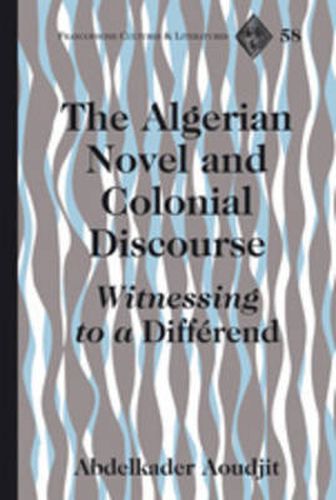Readings Newsletter
Become a Readings Member to make your shopping experience even easier.
Sign in or sign up for free!
You’re not far away from qualifying for FREE standard shipping within Australia
You’ve qualified for FREE standard shipping within Australia
The cart is loading…






This title is printed to order. This book may have been self-published. If so, we cannot guarantee the quality of the content. In the main most books will have gone through the editing process however some may not. We therefore suggest that you be aware of this before ordering this book. If in doubt check either the author or publisher’s details as we are unable to accept any returns unless they are faulty. Please contact us if you have any questions.
During the last fifty years, Mouloud Feraoun, Mohammed Dib, Mouloud Mammeri, and Kateb Yacine achieved significant international recognition yet remain little known in the United States. Filling a pressing need, The Algerian Novel and Colonial Discourse provides a critical introduction and a new approach to the works of these Algerian novelists. Beginning with an overview of their novels, this book goes on to discuss critical approaches to them, challenging the widely held notion that they are merely ethnographic, upholding the status quo. The Algerian Novel and Colonial Discourse provides a new reading, and, most significantly, argues that they are best read as witnesses to the kind of conflict Jean-Francois Lyotard calls a differend - a conflict in which one suffers an injustice and is at the same time deprived of the means to argue. The Algerian Novel and Colonial Discourse then examines the issue of humanism that the novels allegedly both appeal to and reject and demonstrates that the Algerian authors’ condemnation of colonialism is both a coherent political position and consistent with their critique of liberal humanism. It concludes with a discussion on the ongoing relevance of the Algerian novels.
The Algerian Novel and Colonial Discourse includes a glossary and a short history of modern Algeria to provide readers with the political and cultural contexts they need to understand its literature. This combination of innovative theoretical approach and political context makes this book of utmost importance for students of Francophone literature and for literary critics interested in colonialism, postcolonialism, and Lyotard’s philosophy.
$9.00 standard shipping within Australia
FREE standard shipping within Australia for orders over $100.00
Express & International shipping calculated at checkout
This title is printed to order. This book may have been self-published. If so, we cannot guarantee the quality of the content. In the main most books will have gone through the editing process however some may not. We therefore suggest that you be aware of this before ordering this book. If in doubt check either the author or publisher’s details as we are unable to accept any returns unless they are faulty. Please contact us if you have any questions.
During the last fifty years, Mouloud Feraoun, Mohammed Dib, Mouloud Mammeri, and Kateb Yacine achieved significant international recognition yet remain little known in the United States. Filling a pressing need, The Algerian Novel and Colonial Discourse provides a critical introduction and a new approach to the works of these Algerian novelists. Beginning with an overview of their novels, this book goes on to discuss critical approaches to them, challenging the widely held notion that they are merely ethnographic, upholding the status quo. The Algerian Novel and Colonial Discourse provides a new reading, and, most significantly, argues that they are best read as witnesses to the kind of conflict Jean-Francois Lyotard calls a differend - a conflict in which one suffers an injustice and is at the same time deprived of the means to argue. The Algerian Novel and Colonial Discourse then examines the issue of humanism that the novels allegedly both appeal to and reject and demonstrates that the Algerian authors’ condemnation of colonialism is both a coherent political position and consistent with their critique of liberal humanism. It concludes with a discussion on the ongoing relevance of the Algerian novels.
The Algerian Novel and Colonial Discourse includes a glossary and a short history of modern Algeria to provide readers with the political and cultural contexts they need to understand its literature. This combination of innovative theoretical approach and political context makes this book of utmost importance for students of Francophone literature and for literary critics interested in colonialism, postcolonialism, and Lyotard’s philosophy.